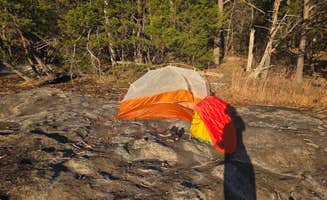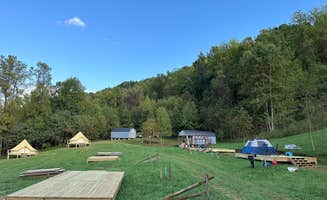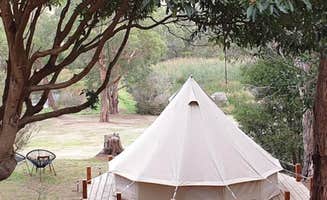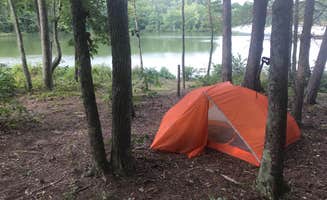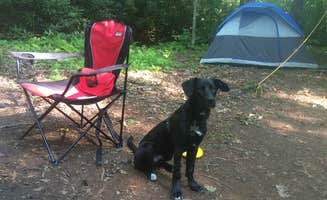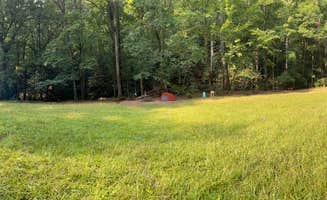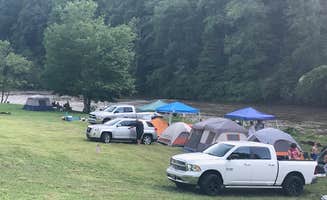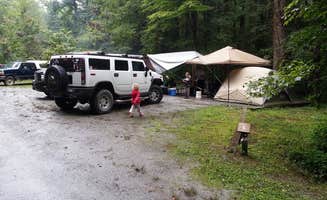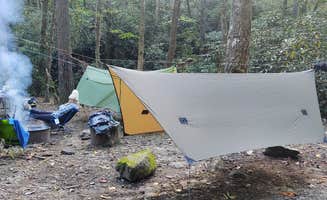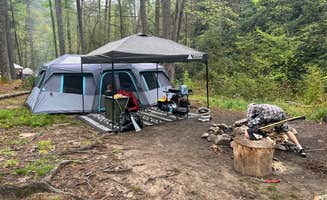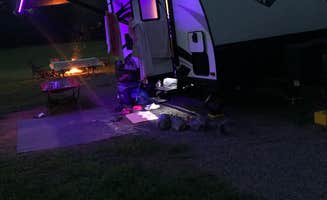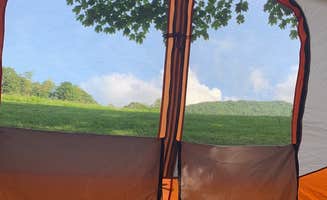Tent campsites near Stony Point, North Carolina include options at higher elevations with temperatures 10-15 degrees cooler than surrounding lowlands during summer months. Some primitive camping sites in the area require a 1-mile hike to access, while others feature creek-side locations with natural swimming holes. Many campgrounds close several sites during rainy seasons due to flooding potential.
What to do
Waterfall exploration: 0.5-mile hiking access. At Mortimer Campground, tent campers can reach a small waterfall via a trail that starts directly from the campground. "Beautiful, clean grounds with access to a 1/2 mile round trip hike to a waterfall on the property," notes one visitor. The Wilson Creek area surrounding the campground offers additional outdoor activities.
Mountain biking: 13+ miles of trails. The W. Kerr Scott Visitor Assistance Center serves as the starting point for the Overmountain Victory Trail (OVT) mountain bike route. "Great trails for all levels of mt bikers. About 13 miles one way and return to visitors center," reports a regular rider. This trail system accommodates beginners through advanced cyclists.
Fishing: Stocked trout ponds. Multiple camping areas feature fishing opportunities, with some ponds stocked regularly. At Self Sufficient Holler, "we caught a trout in the pond right away," one camper reports. Streams throughout the region offer additional fishing spots, though some require special permits during certain seasons.
What campers like
Cooler temperatures at higher elevations. The mountain camping locations provide natural air conditioning during hot months. At Blue Bear Mountain Camp, campers enjoy significantly lower temperatures than surrounding areas. "Not only is the weather so much cooler in the summer there (70-80 in July!), it's just a wonderful, down to earth place to be," notes a repeat visitor.
Clean bathroom facilities. Despite the rustic settings, several campgrounds maintain well-kept bathrooms. "This is by far the cleanest bathhouse I have ever seen," reports a camper at Blue Bear Mountain Camp. Bathroom quality varies significantly between campgrounds, with some offering showers while others provide only basic facilities.
Creek-side campsites with natural sound barriers. Multiple tent camping locations feature sites positioned along creeks and streams. "Many of the campsites are situated along Thorps Creek, so the sound of the creek can lull you to sleep," shares a Mortimer Campground visitor who stayed on site #6.
What you should know
Limited cell service and supply access. Most tent campsites require planning ahead as quick resupply trips aren't practical. "This campground is down a pretty long gravel road, so it's best to have what you need when you arrive. No quick trips to Wally World for resupply here," advises a Mortimer Campground visitor. Cell service ranges from spotty to non-existent at most locations.
Weather-related closures common. Campground accessibility depends heavily on recent rainfall. "High risk of flood in the area, and there's a few bridges you have to drive over to get there so they might be flooded if it rains," cautions a visitor about the Wilson Creek area. Many campgrounds close low-lying sites during wet seasons.
Tent site privacy varies significantly. Site layout and spacing differ dramatically between campgrounds. At Lake Curriher Wilderness, "the regular tent 'loop' is just one big open field with few trees around it, so there's absolutely no privacy." Other campgrounds offer more secluded options, particularly at walk-in sites.
Tips for camping with families
Choose campgrounds with kid-friendly trails. Family-friendly hiking options make camping more enjoyable with children. "This is a great family campground. There are bathrooms and showers. There are trails and even a waterfall within half a mile from camp," shares a parent who stayed at Mortimer Campground.
Look for camping areas with water features. Streams, creeks and small waterfalls provide natural entertainment for children. A visitor to Growing Faith Farms & Retreat reports their family had "the best camping trip we've had in a long while" and specifically mentioned that "the kids say, 'leave them 10k stars on the review!'"
Check campground gate closure times. Some facilities have early closing times that can complicate late arrivals. At Lake Curriher Wilderness, "the gates close at 5pm during the fall/winter," notes a camper who also mentioned that the retired police chief came by to introduce himself and provide his phone number for safety concerns.
Tips from RVers
Fill water tanks before reaching campgrounds. Most tent camping areas near Stony Point lack water hookups at individual sites. At Blue Bear Mountain Camp, "they do not have water hookups - you fill your camper tank with water at the office area," explains a regular visitor who adds that "they have spots with electric hookups" and "a dump station where you can empty your tanks on your way out."
Expect narrow, challenging access roads. RV access to many tent camping locations requires navigating difficult terrain. "The state maintained gravel road used to access campground was narrow and would be difficult to get a large camper up there, although there were lots of large ones there," reports a camper at Blue Bear Mountain Camp who recommends smaller vehicles when possible.


